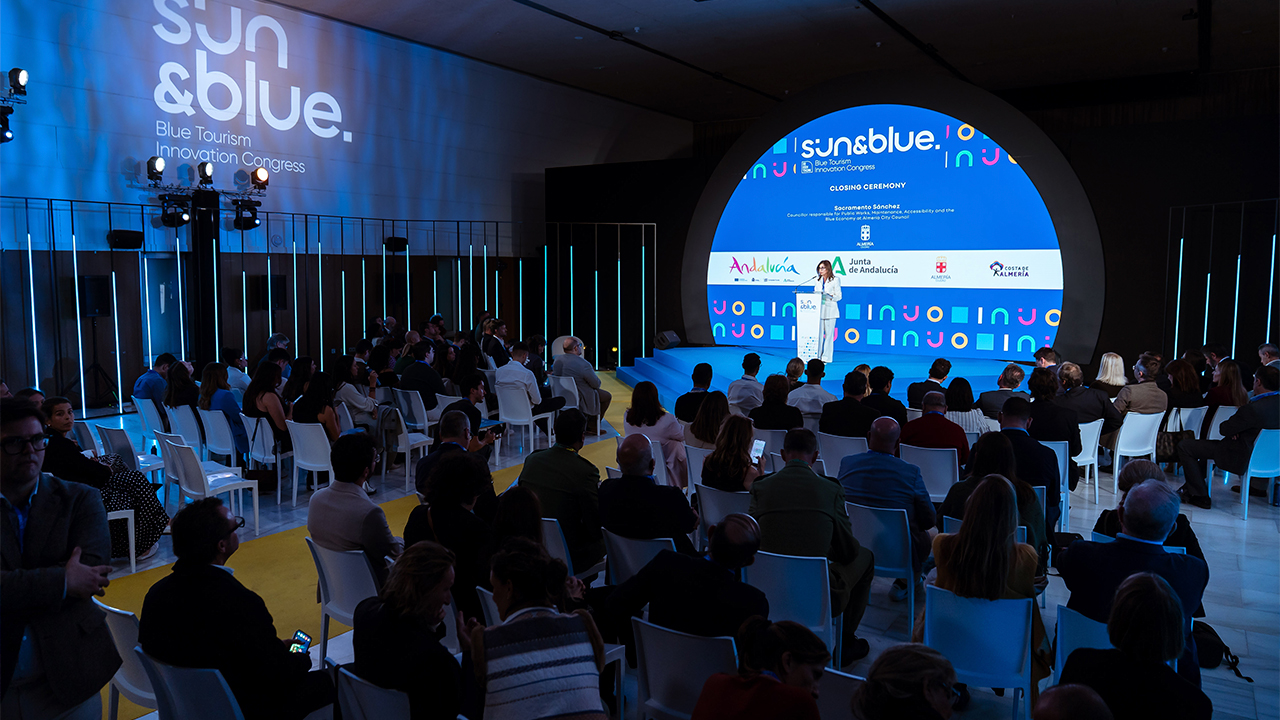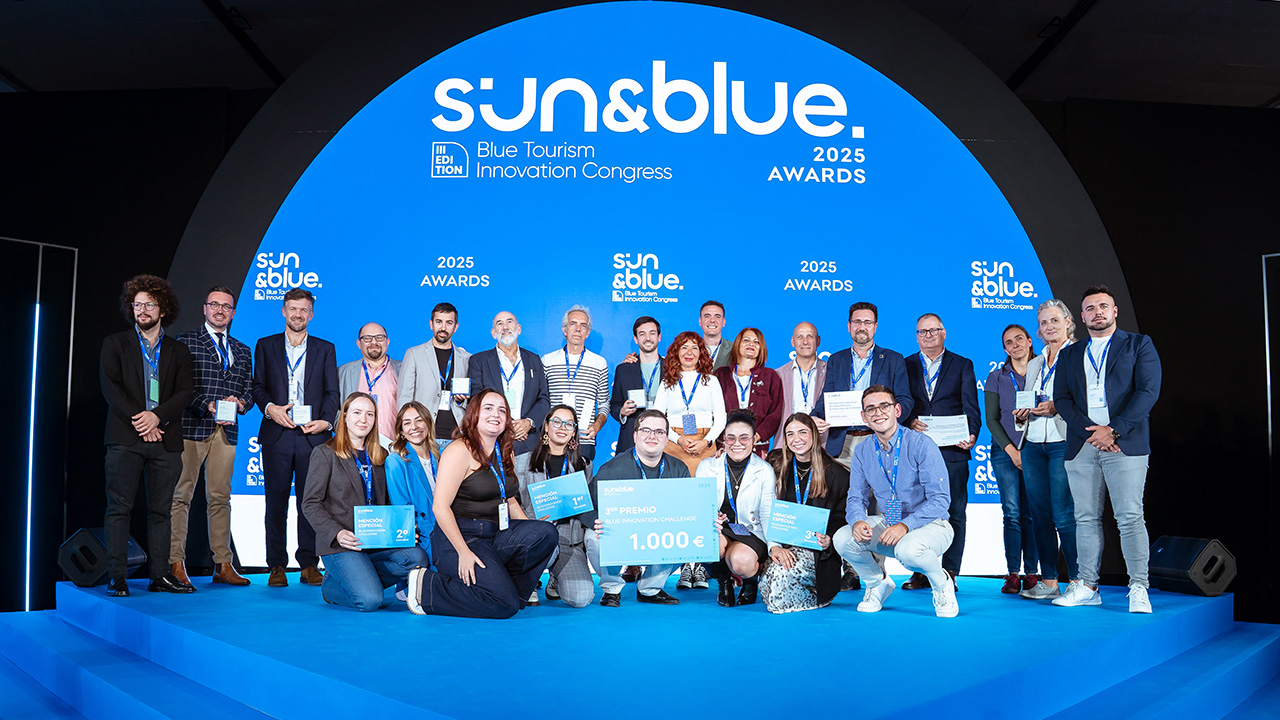Sun&Blue Congress closes its second edition with the participation of 1,100 attendees
During the congress, industry professionals called for innovation, collaboration and decisive action to transform cities, ports and coasts.
Published at 1 year ago
Sun&Blue Congress, international congress of Tourism and Blue Economy closed this morning its second edition. The event, promoted and organized by beon. Worldwide and sponsored by the Ministry of Tourism and Andalusia Exterior of the Junta de Andalucía, the City of Almeria, the Ministry of Agriculture, Fisheries, Water and Rural Development of the Junta de Andalucía and the Diputación de Almería, has brought together a total of 1,100 unique participants from 33 countries, during three days of celebration at the Palacio de Exposiciones y Congresos 'Cabo de Gata - Ciudad de Almería'.
Its extensive scientific program, which has focused on the themes of Ports and Maritime Industry, Islands and Territories, Coasts and Beaches, Technology, Energy, Financing, Sports, Culture and Gastronomy, and Hospitality, has hosted 4 keynotes and 33 round tables. There were also 12 side events.
Tim Ott, director of Sun&Blue Congress, was in charge of presenting the conclusions of the congress and giving voice to the needs and demands that the sector's agents have conveyed during the event. “The future is in our hands, and sustainability is not an option, but a collective commitment. Through innovation, collaboration and determined action, we can transform our cities, ports and coasts into living examples of harmony between humanity and nature.” As Ott announced, all the conclusions will be collected in a publication called the “Sun&Blue Blue Book” that will see the light of day in the coming months.
Conclusions Sun&Congress 2024
Keynotes
The keynotes addressed topics such as the urgency to act in the face of climate and technological challenges. The need to innovate beyond existing knowledge, foster public-private collaborations and overcome barriers to data sharing were emphasized. In addition, the importance of combining experience and youth to address sustainability challenges was underlined.
Track: Ports and Maritime Industry
Sustainable port development depends on collaboration between ports, cities and administrations. Technological innovation and the transition to clean energy are priorities to integrate ports with cities, improve their efficiency and decarbonize the nautical industry.
Track: Technology
Technology is key to transforming tourism and maritime management. Digital twins, data spaces and smart platforms offer solutions to optimize resources and ensure sustainability. However, standardization, political support and inclusive access to these tools are required to avoid lags in small municipalities.
Track: Culture and gastronomy
Culture and gastronomy are pillars to break the seasonality of tourism. Festivals, haute cuisine and local products are integrated into sustainable experiences that highlight the identity of the territories. Aquaculture and the Mediterranean diet stand out as drivers of food innovation and tourist attraction.
Track: Islands and territory
Islands face unique challenges in the face of climate change such as flooding and decarbonization. Science-based planning, institutional collaboration and citizen involvement are key to creating climate adaptation strategies that prioritize sustainability and policy dialogue.
Track: Coasts and beaches
Sustainable coastal management focuses on preserving the coastline in the face of climate change, promoting environmental education and technologies such as AI and sensors to optimize resources. Certifications, digital planning and innovative projects seek to balance environmental conservation with tourist attraction.
Track: Financing
Tourism is in a phase of continued growth, with a possible era of mass tourism on the horizon and funding in this sector depends on increased collaboration. During the congress, different financing opportunities were presented and the 3P's: people, planet and profit were highlighted.
Track: Energy
The potential of the sea as a source of energy and the need for education in coastal communities was highlighted, involving both entrepreneurs and citizens to promote the circular economy and the reduction of consumption. Emphasis was also placed on the need for ports and marinas to integrate sustainability beyond their facilities, offering services such as electric recharging points.
Track: Hospitality
Sustainability in the hotel sector must be integrated from planning to daily operations, involving employees, local communities and suppliers. Designing and executing concrete actions such as the use of efficient energy, recyclable materials and strict criteria to minimize environmental impact are essential. Furthermore, communicating these efforts to the customer strengthens the sector's environmental commitment. Sustainability is no longer a competitive advantage, but a necessity to stay relevant.
Track: Sports
Sport is consolidating as a catalyst for sustainable tourism, fostering a connection with nature and supporting local communities. Examples such as The Ocean Race and surfing in Peru demonstrate how sport can combine adventure, scientific research and environmental protection. In addition, activities such as golf have evolved to incorporate sustainable practices.
The closing ceremony was attended by Tim Ott, director of Sun&Blue Congress; Sacramento Sánchez, deputy mayor of Almería; Consolación Vera, deputy minister of Agriculture, Fisheries, Water and Rural Development of the Junta de Andalucía; Juan José Alonso, territorial delegate of Tourism, Culture and Sport in Almería; and Fernando Giménez, vice-president of the Diputación de Almería.
.jpg)


